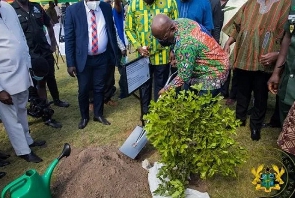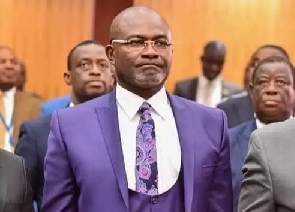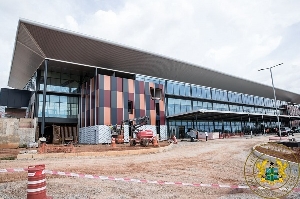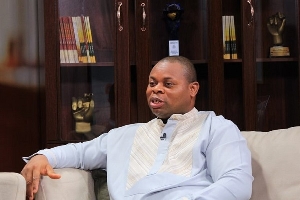Opinions of Monday, 12 June 2023
Columnist: Frimpong-Manso Institute
Green Ghana Day initiative and the protection of Ghana’s environment
The world celebrated this year's World Environment Day under the theme "Beat Plastic Pollution" on June 5, 2023, and this was followed up by the 3rd edition of Green Ghana Day on June 9, 2023.
Green Ghana Day is an initiative of the Government of Ghana aimed at planting 10,000,000 tree seedlings across the country and creating awareness about the effects of climate change on the environment. The President is reported as saying that "Green Ghana Day is a day of hope for climate action".
Currently, Ghana generates approximately 0.84 million metric tonnes of plastic waste per year, and only about 9.5% of that is collected for recycling. This leaves approximately 0.76 million metric tonnes uncollected, choking our drainage systems and causing floods when it rains.
Incidences of floods have been exacerbated by climate change and variability, resulting in significant losses of lives and properties running into millions of dollars. Our actions and lifestyle continue to contribute to global warming, with projected increases in temperature and erratic rainfall, as confirmed by the 6th Assessment Report by the Intergovernmental Panel on Climate Change.
Unfortunately, developing countries, including Ghana, with weak adaptive capacity and low infrastructural development will suffer disproportionally from the adverse consequences of global warming and climate change.
As a country, Ghana continues to experience unprecedented levels of environmental degradation, including forest destruction through unsustainable mining practices via illegal mining, and harmful agricultural practices. These destructive practices have the tendency to derail the economic gains recorded over the years and hamper our ability to achieve our Sustainable Development Goals, particularly those relating to poverty reduction and food security.
The livelihoods of millions of households across the country are predominantly dependent on our forest resources, and any destruction of the environment provokes dire consequences for such livelihoods.
Addressing these challenges should involve collective, multi-faceted efforts from all stakeholders, including public and private players across all levels of society — district, regional, and national.
In light of the above, that the Frimpong-Manso Institute (FMI) wishes to commend the government and its agencies for spearheading this year's Green Ghana Day initiative under the theme "Our Forests Our Health".
Trees, and for that matter, forests, are critical components of ecosystems and provide mechanisms for removing greenhouse gases from the atmosphere —the culprits of climate change and global warming — through the utilization of carbon dioxide. We should therefore do whatever is within our means to promote tree planting.
Tree planting should become part of our civic responsibility and be seen as part of our everyday lives.
While commending the government for the Green Ghana Day initiative, FMI wishes to encourage various ministries, agencies, and departments, as well as other stakeholders, to put in place mechanisms and strategies to ensure the growth and development of trees planted.
Since a significant amount of time and some of our scarce financial resources have been put into this noble initiative, we call for a robust mechanism to monitor and evaluate the survival and growth of planted trees to ensure long-term success.
Follow-up, including care and replacement, is often neglected. The use of drones is one way of monitoring tree health, survival, and growth to assess the effects of our tree planting efforts.
Additionally, photographs could be taken before planting and thereafter about twice a year by locating points with a clear view of both the planted sites and notable landmarks, resource permitting. This should be accompanied by ground surveys.
We further urge Ghanaians to take environmental management seriously by making sure our actions do not negatively contribute to the destruction of the environment.
We stress the need for increased awareness creation among the populace on the importance of safeguarding the integrity of our environment. This is particularly important in light of the wanton destruction being witnessed across the country. There is a need to always remind ourselves that our very existence as mankind is dependent on the ecosystems and their support systems.
Finally, we should proactively enforce regulations and by-laws relating to the protection of our environmental resources. It is only through these efforts that we can serve notice to the general public and other users of our environmental resources of the need to protect our natural environment or face the consequences.













